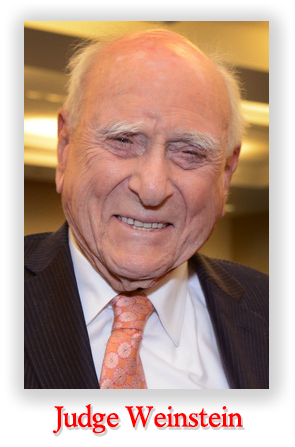We post news and comment on federal criminal justice issues, focused primarily on trial and post-conviction matters, legislative initiatives, and sentencing issues.

JUDGE WEINSTEIN TERMINATES SUPERVISED RELEASE EARLY FOR POT-SMOKING DEFENDANT
 We have always considered 96-year old Judge Jack Weinstein to be one of the shining stars of the federal judiciary, and he again has not disappointed us. Noting that marijuana has become increasingly accepted by society and at the same time expressing skepticism at the whole idea of supervised release, Judge Weinstein last week ended a supervised release revocation hearing by finding that while the defendant continued to use marijuana while on supervision, the Judge not only would not revoke his supervised release, but actually terminate supervision early, thus freeing the defendant from supervised release altogether. At the same time, Judge Weinstein pledged he would no longer revoke SR simply because defendants smoked weed.
We have always considered 96-year old Judge Jack Weinstein to be one of the shining stars of the federal judiciary, and he again has not disappointed us. Noting that marijuana has become increasingly accepted by society and at the same time expressing skepticism at the whole idea of supervised release, Judge Weinstein last week ended a supervised release revocation hearing by finding that while the defendant continued to use marijuana while on supervision, the Judge not only would not revoke his supervised release, but actually terminate supervision early, thus freeing the defendant from supervised release altogether. At the same time, Judge Weinstein pledged he would no longer revoke SR simply because defendants smoked weed.
“Many men and women who have terms of incarceration imposed by this court are seeking to live productive, law-abiding lives, but are derailed by their marijuana addiction. Like many federal trial judges, I have been terminating supervision for ‘violations’ by individuals with long-term marijuana habits who are otherwise rehabilitated,” Judge Weinstein wrote. “No useful purpose is served through the continuation of supervised release for many defendants whose only illegal conduct is following the now largely socially acceptable habit of marijuana use.”
Judge Weinstein pointed out that the trend nationally is in favor of marijuana legalization, that blacks are eight times as likely to be arrested for pot as are whites, and that supervised release law is Draconian in its requirement that all pot must use lead to revocation.
 For those who came in late, every felony defendant convicted in the federal system must be sentenced to a term of supervised release after release from incarceration. SR, during which the defendant is under the thumb of the U.S. Probation Office, restricts travel, association, employment, and a wide variety of other freedoms, all in the name of helping the inmate to become a productive member of society. Not only (and what follows is our opinion, like you could not tell) is supervised release as useless as a trampoline to a grasshopper, but it is counterproductive: a third of all people on supervised release face revocation at least once during their term, seldom for criminal conduct but often for technical violations of the amorphous and vague SR conditions imposed by the courts and administered by probation officers.
For those who came in late, every felony defendant convicted in the federal system must be sentenced to a term of supervised release after release from incarceration. SR, during which the defendant is under the thumb of the U.S. Probation Office, restricts travel, association, employment, and a wide variety of other freedoms, all in the name of helping the inmate to become a productive member of society. Not only (and what follows is our opinion, like you could not tell) is supervised release as useless as a trampoline to a grasshopper, but it is counterproductive: a third of all people on supervised release face revocation at least once during their term, seldom for criminal conduct but often for technical violations of the amorphous and vague SR conditions imposed by the courts and administered by probation officers.
In the case in front of Judge Weinstein, Tyran Trotter had served two years of his 3-year SR term, after release from prison on a heroin distribution beef. Tyran had stayed out of trouble for two years, except for chronic pot use. “Many people from all walks of life now use marijuana without fear of adverse legal consequences,” Judge Weinstein wrote. But the criminal-justice system, he went on, “can trap some defendants, particularly substances abusers, in a cycle where they oscillate between supervised release and prison.”
 Judge Weinstein’s 42-page opinion was as much an indictment of supervised release as it was federal drug law. He cited a Sentencing Commission study showing that 85% of judges believe designating drug use as a violation of supervised release “is not desirable,” According to the study, 74 percent of the judges said the same about people who failed three drug tests in a year. What’s more, the judge noted, while supervised release is required by statute in less than half of all federal cases, it is reflexively imposed in 95% of all sentences. “The criminal justice ecosystem largely ignores supervised release,” the judge wrote. “Off the record conversations with a number of federal defenders (from both the Eastern and Southern Districts of New York) revealed that the perceived mandatory nature of supervised release is so entrenched that they do not even bother to fight its imposition, or even the length of a term.”
Judge Weinstein’s 42-page opinion was as much an indictment of supervised release as it was federal drug law. He cited a Sentencing Commission study showing that 85% of judges believe designating drug use as a violation of supervised release “is not desirable,” According to the study, 74 percent of the judges said the same about people who failed three drug tests in a year. What’s more, the judge noted, while supervised release is required by statute in less than half of all federal cases, it is reflexively imposed in 95% of all sentences. “The criminal justice ecosystem largely ignores supervised release,” the judge wrote. “Off the record conversations with a number of federal defenders (from both the Eastern and Southern Districts of New York) revealed that the perceived mandatory nature of supervised release is so entrenched that they do not even bother to fight its imposition, or even the length of a term.”
The average length of a supervised release terms has increased from 42 months 20 years ago to 47 months today. “The combination of supervised release being imposed in nearly every case with increasingly long terms has greatly expanded the total supervised population.” As a result, the number of people on SR has increased three-fold in two decades, from 39,000 people in 1995 to nearly 115,000 in 2015.
 Studies, the Judge said, show that the “current reflexive use of longer than needed supervised release periods may increase the likelihood of recidivism… While it is not clear exactly why this occurs, possible reasons include the fact that supervising low-risk people and placing them in programs can disrupt their pro-social networks, as well as the fact the increased supervision and the associate conditions increase the likelihood of violations… Extended periods of community supervision can have negative consequences for offenders and the public. One common result is that more offenders are sent to prison for violating the terms of their supervision (known as technical violations) than for new crimes. More than two-thirds of all federal offenders who are revoked from supervised release each year committed technical violations but were not convicted of new crimes.”
Studies, the Judge said, show that the “current reflexive use of longer than needed supervised release periods may increase the likelihood of recidivism… While it is not clear exactly why this occurs, possible reasons include the fact that supervising low-risk people and placing them in programs can disrupt their pro-social networks, as well as the fact the increased supervision and the associate conditions increase the likelihood of violations… Extended periods of community supervision can have negative consequences for offenders and the public. One common result is that more offenders are sent to prison for violating the terms of their supervision (known as technical violations) than for new crimes. More than two-thirds of all federal offenders who are revoked from supervised release each year committed technical violations but were not convicted of new crimes.”
This has created the “threat of never-ending supervision,” the Judge said. But not for Tyran. Judge Weinstein set him free from his SR term.
Memorandum Opinion and Order, United States v. Trotter, Case No. 15-cr-382 (E.D.N.Y., July 5, 2018)
– Thomas L. Root
